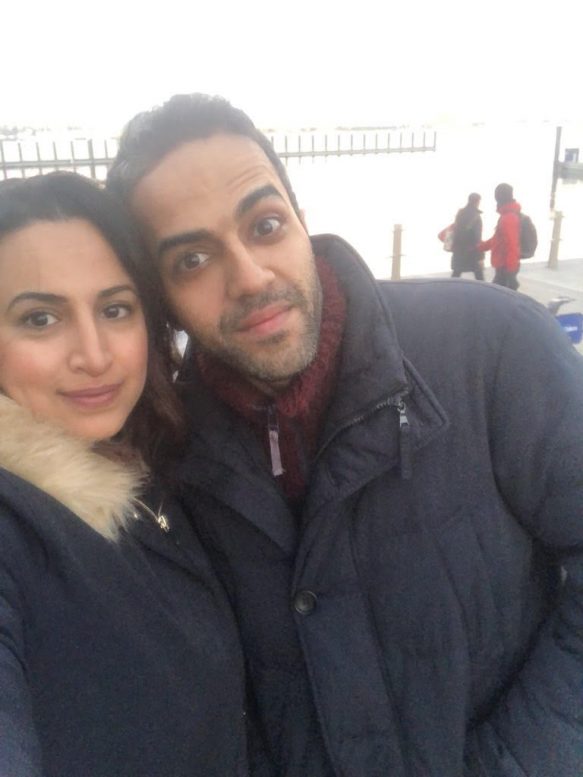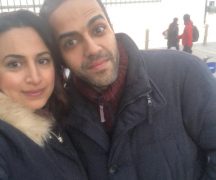By DAVID DUPONT
BG Independent News
Back home in Saudi Arabia, Malak “Angel” Al-Sheri could be put in prison for sitting in a coffee shop, talking with a reporter.
The Saudi government would consider that traitorous.
That’s why she’s sitting in a coffee shop in Bowling Green, Ohio, talking to a reporter.
Saudi Arabia has long been repressive toward women, but in recent years, even as the country lifted its ban on women driving, authorities have stepped up their crackdown on women’s rights activities. Al-Shehri said before the restrictions were clearer, now the “red lines” have disappeared. No one knows what will land them in prison.
Al-Shehri doesn’t know why her husband, Ayman Al-Drees, and a group of his friends are now in prison, and why a number of women’s rights activists have been rounded up in the past 13 months.
“Me, my husband, this group, we were part of the people who had hope,” Al Shehri said. “It was a lie. We were optimistic, but it wasn’t what we felt it was.”
That’s why Al-Shehri is in Bowling Green. After a half dozen of her fellow activists were arrested in May 2018, she fled to the United States. Al-Drees stayed behind. They weren’t prepared financially to live in the United States. He did come over twice to visit, and during one of those visits he brought her to Bowling Green, his American home, and to meet his American family, the Hubbell-Staebles. He had gotten to know the family while studying business at Bowling Green State University. He graduated in 2016.
After that most recent visit Al-Drees returned to Saudi Arabia. Why wouldn’t he, he told his wife? He had done nothing wrong. But in April he was one of a dozen men swept up and put in prison.
Al-Shehri doesn’t know what red line they crossed.
Now in the United States, Al-Shehri is doing what she can.
This May she spoke at the PEN America Literary Gala at which three activists Nouf Abdulaziz, Loujain Al-Hathloul, and Eman Al-Nafjan were honored with the human rights group’s Barbey Freedom to Write Award. They were among the activists arrested a year ago. Al-Nafjan was released under conditions that amount to house arrest. The other two remain imprisoned.
According to PEN America, they have had “little contact with or access to family members or counsel during months of detention without charge, and have reportedly been subject to torture, isolation, and threats of rape.”
The activists are opposing a system, PEN stated, where “(W)omen’s rights are particularly restricted, including under the architecture of the ‘guardianship system’ which constricts women’s ability to travel, marry, drive, work, or receive education and healthcare without approval from a male guardian.”
It was after these arrests that Al-Shehri fled. “I felt there was high possibility I was targeted.”
She has been imprisoned for her activism before. Her acts of civil disobedience garnered worldwide attention.
Among those arrested then were several men, whose cases did not get the attention that the women’s arrests received, something Al-Shehri criticized.
Those men included the attorney who represented the activists Dr. Ibrahim Al-Modaimeegh and
Mohammad Al-Rabea.
Al-Modaimeegh like most of the others have been released from prison under tight restrictions.
But Al-Rabea is still in prison. “He was the friend of all the group of people who were arrested in April,” Al-Shehri said.
In addition to Al-Drees, who was a translator of human rights documents and an insurance underwriter, those arrested, according to PEN, were: Thamar Al-Marzouqi, writer; Khadijah Al-Harbi, feminist writer; Salah Al-Haidar, a writer with US dual citizenship and the son of women’s rights activist Aziza Al-Yousef who was arrested in the first crackdown; Mohammed Al-Sadiq, writer and researcher; Abdullah Al-Shehri, lawyer; Shikha Al-Orf, physician and translator; Fahad Aba Al-Khail, activist; Abdullah Al-Duhailan, journalist, writer, and show host; Bader Al-Ebrahim, physician and writer with US dual citizenship; Naif Al-Hindas, writer and translator; Moqbel Al-Saggar, writer who published a novel about women’s suffering in Saudi Arabia; Ridha Al-Bouri, writer and photographer; and Ali Al-Saffar, writer.
In announcing the arrests the Saudi Government said they threatened the security and stability of the kingdom and its social safety and threatened national unity, and recruited others in the effort.
While deeply concerned for the welfare of her husband, Al-Shehri wants all those imprisoned remembered.
Making sure they are not forgotten is her mission though she’s almost 7,000 miles away.
That has included meeting with members of Congress.
While she’s ever watchful of saying something that could make their situation worse, she knows being silent will not work. Other families have been quiet, and it didn’t help those imprisoned. Those whose family members spoke out saw some progress in their cases.
“We have the privilege to speak and say loudly that they’re innocent.”
The Saudi government is spending a lot of money on public relations to polish its image.
“We can at least say the things that are not true. We can’t leave the public space with only one voice, only one opinion.”
She added: “I wish that we could do this from inside the country, but we can’t. We don’t have many choices and that’s the situation we are in. We are not able to speak within our country. We tried, but the price is really high.”


